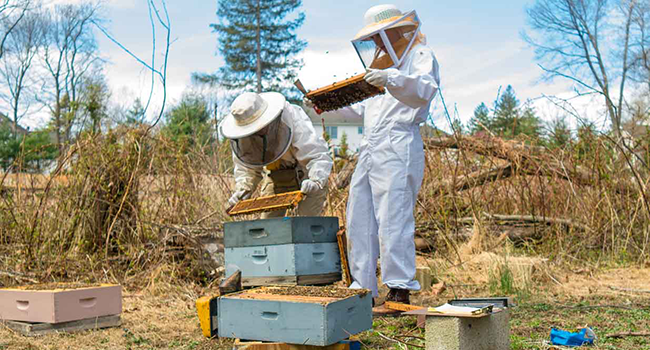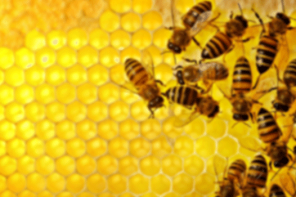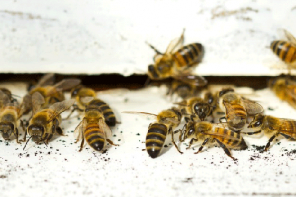By: Stephen Bishop
Proper beekeeping jargon dictates that the term hive means the box, the boards nailed and glued, which house the many thousand bees, the colony.
A colony is a super-organism of individual bees who work themselves to death all for the greater good of the colony. The queen, as her title indicates, is important; she is an egg laying machine fueled with royal jelly by her ladies in waiting, a group of worker bees attending her needs. Still, the queen like all bees is replaceable. If something is amiss, mainly if her egg production drops too low, workers begin supersedure, the process of raising a new queen. Most of you know all this. The point here is that all this occurs under the nose of the old queen. For reasons unknown, it’s unclear why some colonies allow the old queen to live out her days, a peaceful transition, or why others ball her. A vibrating mass of worker bees mob the old queen causing death by overheating.
The queen is dead. Long live the queen.
Frustration is as contagious as foulbrood. And this month’s column is mostly me being foul, so take it with a big grain of salt. Today a frustrated farmer has told me I work for him, that all USDA, Extension, farm supply staff, corporate seed reps and agronomists work for him. Without farmers, we wouldn’t have jobs. I agree. In fact, we wouldn’t eat.
Furthermore, when county economic development staff attended a meeting of our Farmland Preservation Board to learn about opportunities for economic development within agriculture, one staff member said the perception is farmers are lone men on tractors, a few individuals and thus few jobs. Nothing could be further from the truth, we reassured him. Farmers are few but their support staff is legion. The coterie keeps them productive – planting corn, raising chickens, feeding the world.
Still, the farmer is outraged. His point of grievance is often the fact the coterie is supposed to be helping him and not doing a good job of doing so. He should know by now. He was involved in a seed company’s grand inquisition in the county, paid his fine. He has poultry houses and is now being forced to upgrade or risk losing his contract. Again, he tells me we work for him. He understands I can do nothing. He wants to vent. Currently, he is upset that the USDA county average for soybeans is 28 bushels per acre. This seems low. Federal crop insurance pays only for the loss in yield up to the county average. In this drought year, if the county average reflected yields in recent years, say around 35 bushels, more money would go into his pocket. But updating the county average is a shrouded and convoluted process with three different federal agencies (RMA, NASS, and FSA) involved; phone calls have been made to Raleigh, to Washington, but no one can explain the entire protocol for updating the average. The frustrated farmer threatens to call Washington himself, his representatives and senators. He says they work for him.
The problem is they don’t. (Of course, I don’t tell him that, but instead nod my head in affirmation.) They receive hefty campaign donations from agricultural conglomerates, not individual farmers. In modern agriculture, it sometimes seems individual farmers matter only in as much as they keep producing according to protocol. If production drops, if something is amiss, the colony begins the process of supersedure. Modern agriculture resembles a super-organism, pampering individual farmers until they buck the system. Then it’s get big or get out, buy our patented super seeds yearly or face fines or lawsuits (or bankruptcy in one case here), upgrade poultry houses or lose the contract. The individual farmer is replaceable. Don’t get me wrong, I love and appreciate super-organisms and their productivity, bees and agriculture both, but even still I feel a tinge of remorse when I have to smash a queen – or when I see an individual farmer being smashed.
And in all this frustrated contemplation, I sometimes wonder if the process of replacing American beekeepers is also before us, happening right under our nose – self-fertile almond trees are being tested and planted in California, China is suddenly Johnny Almond Seed and has greatly expanded almond plantings, and honey laundering has already deflated bulk prices for those not wanting to pollinate. But what can and should individual beekeepers do – go along peacefully or risk getting balled? I plan to go peacefully. In fact, I think I’ll buy a Flow Hive and plumb a line straight from hive to kitchen pantry, thus replacing myself.









